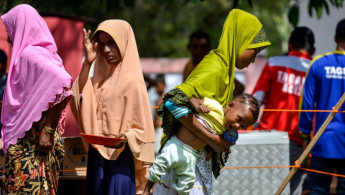Nearly 200 starving Rohingya reach Indonesia after month at sea
Some died of sickness. Others of dehydration.
But after more than a month adrift on the Andaman Sea without much food, medicine or a working engine, nearly 200 Rohingya reached western Indonesia's Aceh province after their overcrowded, rickety wooden boat finally reached shore on Monday.
Among the emaciated refugees who survived the harrowing voyage, some were so malnourished they could barely walk and many had to be rehydrated via IV drips.
Gaunt young children, as well as men and women, queued for food, baths and haircuts after spending the night on the floor of a local mosque.
"Some people died in the boat. Around 26 people. We threw them out to the sea," said Rasyit, an exhausted-looking refugee.
Every year when the monsoon season abates, thousands of Rohingya flee violence in Myanmar and squalid refugee camps in Bangladesh on perilous sea voyages run by human traffickers who promise sanctuary abroad.
Malaysia and Indonesia are favoured destinations for the persecuted Muslim minority, but they are often caught up in what the United Nations has called "human ping-pong" as governments turn them away.
The group in Aceh said after Malaysia refused to allow them to dock, they spent weeks waiting for the wind to buffet them ashore.
Local authorities estimated the boat was carrying 174 people.
"We left Bangladesh [and] after 10 days our rations finished," said 14-year-old Umar Faruq, who was travelling without any family.
"The engine broke down after seven days. [Then] Malaysia didn't let us arrive."
When they embarked, they had only enough clean water for seven days and food to last 10, he said.
"We were at sea one month and 10 days."
Medical teams from the International Organization for Migration "treated cases of severe dehydration and malnutrition", Louis Hoffmann, the head of mission in Indonesia, told AFP on Tuesday.
Theirs was the fourth such vessel to arrive in Indonesia in the past two months, according to the United Nations High Commissioner for Refugees (UNHCR), which fears another 180 refugees may be dead after their boat sank somewhere in the Indian Ocean.
'We felt we could survive'
Nearly one million Rohingya live in camps near Bangladesh's border with Myanmar, many after fleeing a brutal military crackdown in 2017.
With few opportunities for jobs and education in the camps, and no chance of returning to junta-run Myanmar, thousands embark on high-risk sea journeys, often on makeshift boats.
"In Bangladesh, [our life was] difficult. We were prohibited even to go outside of the house, [and] the children cannot go to school," said Muhammad Taher.
Monday's boat landing in Aceh came a day after another vessel carrying 57 Rohingya refugees was pulled ashore on Christmas morning by the Indonesian Navy.
"When we arrived in Indonesian waters, we saw a hilly place and we felt we could survive," Zahid Husein, an 18-year-old refugee told AFP.
"At that time, there was someone among us who was dying because he didn't get food. God gave us a way as we met the Indonesian Navy."
Dozens of hungry and weak Rohingya Muslims were found on a beach in Indonesia’s northernmost province of Aceh on Sunday after weeks at sea...https://t.co/RYBafZ5khC
— The New Arab (@The_NewArab) December 25, 2022
He estimated five passengers had died on the journey.
Unlike several other Southeast Asian countries, Indonesia does not push back Rohingya boats.
However, it does not usually help them to disembark, waiting for fishermen to pluck them from the sea or the wind to blow boats into its coast.
Ann Mayman, UNHCR's representative in Jakarta, called Indonesia "one of the few states in the region to respect basic humanitarian principles for people who cannot return home due to persecution and conflict".
In a tweet, she said around 472 refugees have landed in Aceh in the past six weeks.
UNHCR has noted a "dramatic surge" in attempts to cross the Andaman Sea in 2022, with at least 161 refugees reported dead or missing, according to a recent statement.





 Follow the Middle East's top stories in English at The New Arab on Google News
Follow the Middle East's top stories in English at The New Arab on Google News


